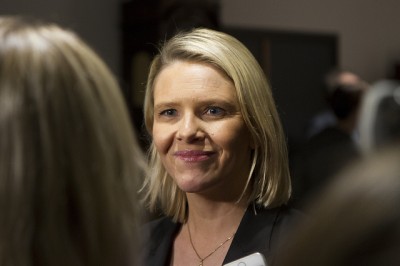Norway’s conservative government coalition moved forward on Tuesday with the introduction of tough new immigration rules, especially aimed at asylum seekers. Sylvi Listhaug, the new minister in charge of immigration and integration, confirmed that Norway looks set to have among the strictest asylum policies in Europe.

Listhaug launched the proposed rules at a press conference in Oslo, and they reflect a compromise reached between the government coalition, its two support parties in Parliament and the opposition Labour and Center parties. That means the rules are likely to be approved after going through the obligatory hearing process that will end February 9. After that, they’ll be acted on in Parliament.
The new rules follow up on efforts launched earlier this autumn to curb the influx of asylum seekers into Norway, which hit around 31,000 this year, according to the latest figures from immigration agency UDI (Utlendingsdirektoratet). That set an all-time record, and refugee arrivals are expected to pick up again when the weather improves at the end of winter.
“UDI says that between 10,000 and 100,000 asylum seekers can come to Norway next year,” Listhaug said. “If we get anywhere near the latter number, it will have enormous consequences for our welfare state.”
‘No drastic cuts needed’
Several researchers disagree, claiming during the Christmas weekend that Nordic welfare systems can absorb the influx although they will be put under pressure. “Both Norway and the other Nordic countries have extremely strong welfare systems that can tolerate quite a large stream of asylum seekers without a need for any drastic cuts,” Anne-Britt Djuve of research institute Fafo told news bureau NTB. Swedish economist and migration researcher Joakim Ruist agreed, saying that the numbers of refugee arrivals aren’t so high that they will force major changes in the welfare system.
Listhaug and Prime Minister Erna Solberg of the Conservative Party nonetheless don’t want to risk jeopardizing Norway’s welfare state at a time of economic downturn, rising unemployment and ever-rising numbers of retirees demanding pension benefits. The Conservatives proposed their own tougher new rules just before the Christmas holidays and they were largely in line with what Listhaug’s party has advocated for years.
Listhaug thus put forth 40 concrete changes in existing laws and regulations, from increasing the waiting period for permanent residence approval from three to five years, to using new methods of confirming asylum seekers’ identities, allowing police to retain fingerprint data for 10 years instead of five and imposing means of more quickly deporting refugees whose applications for asylum were rejected.
Listhaug and the government are also keen to cut welfare benefits accorded to asylum seekers, redefine what constitutes a need for protection and make it much more difficult for those granted asylum to bring family members to Norway as well. Now refugees will have to document up to four years of income or higher education, and thus the ability to support both themselves and additional family members, before any relatives will be allowed to join them in Norway.
Controversial instructions
Listhaug also wants to be able to instruct immigration authorities to withdraw residence permission in Norway if peace returns to refugees’ homelands, and they no longer need protection. That’s a controversial proposal, sure to spark opposition during the hearing process because of the uncertainty it would pose for people simply trying to regain stability in their lives.
Immigrants will also need to prove they have adequate Norwegian language skills and knowledge of Norwegian society before they’ll be eligible for permanent residence, much less citizenship. “We want to put in place demands for permanent residence, because we believe those who come to Norway and want to live here must show strong willingness to actually integrate themselves in Norwegian society,” Listhaug told newspaper VG. “We believe it must have consequences if people don’t want to integrate themselves.”
Others claim that integration works both ways, and that Norwegians must also take on responsibility for reaching out to new arrivals and including them in Norwegian society. The ever-smiling Listhaug’s 150-pages of stricter rules and regulations are likely to face at least some opposition in Parliament, but she’s undaunted.
“Yes, we can come to have asylum politicies that are among the strictest in Europe,” Listhaug told NTB on Tuesday. “And its absolutely necessary if we’re to receive, settle and integrate those who come here.”
newsinenglish.no/Nina Berglund

